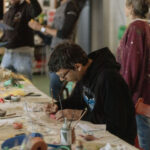Article written by Carlos Jonay Suárez, co-founder of remote villages
Earlier this year, I shared with you something that for us is fundamental: how do we generate positive, and real impact, in the rural environment. Within the post that you have in the previous link, I tell you how we develop socio-economic impact, direct, in the municipality of Antigua, Fuerteventura.
Objectives, challenges, knowledge transfer, SDGs or feedback of the people who participate, are some of the indicators we use, and measure, to know if an experience of remote villages has been successful.
But, this week we wanted to go one step further and know the impact that other projects are generating in rural areas. To do this, we invite you to participate in a panel that was titled How to generate positive impact on the rural environment? to:
-
Carmen Valiña , founder of proudly rural : 'It is a scarf project with roots, and with the sale of each handkerchief directly supporting projects that happen in the rural environment'
-
Pablo Franco , founder to undertake in the town : 'It is a project that helps people who want to go to a rural environment, or a small town in Spain'
-
Sofía Lázaro , co -founder of Terraconta Communication : 'It is a marketing and communication agency that are located in the rural world, to make them more visible.'
During the same, we discuss their projects, how they help their rural territories, what are the challenges ahead and what proposals are having direct effects on them.
Undoubtedly, an atmosphere with a lot of empathy and complicity was generated, through the questions we asked the three, something that enriched the panel and left us some tips .
Identifying the challenges of 'empty Spain'
Throughout the panel we were able to collect many interesting things, as well as know the opinion, and the experience, of Carmen, Pablo and Sofia within the rural environment.
The three told us where their projects are located. Pablo and Sofia (and Diego) are in small villages in the province of Huesca (Nueno and Arguis, respectively) for its part, Carmen is undertaking from Baio, a small town located on the Costa da Morte, La Coruña.
One of the main questions was how do you think Spain has evolved in these last 2 years?
I think he has put rural environments on the map, but at the same time he has brought out one of his biggest problems: there is no possibility of buying homes in these environments.
This response was common for Pablo and Sofia, on the other hand, Carmen argued to not agree with the use of the emptied Spain term, emphasizing that these environments have their own reality, that we must understand and that the projects that projects that They are developing within it.
Within the part of the challenges, some that we have already mentioned in other posts, such as internet connectivity , access to housing or lack of services within them .
star question of the panel What positive impacts are generating your projects in the rural environment? , to which we add, do you think they have been able to generate any negative? , we stay with the following:
Almost all agree that the direct impact they are generating on their environments is through the generation of networks, the hiring of local suppliers (kilometer zero), collaborating with institutions, defending the culture of their territories or supporting local institutions.
Within the negative impact, in addition to the carbon footprint that is always generated, we are left with the following:
We come (to the rural environment) with a 'urban' rhythm and we think that we can contribute a lot of things, that can be very received by many, but can generate rejection in many other people. That is why the important thing is to know your environment and your neighbors (especially in small towns)
Within the video that you have at the beginning of this post, you have the answer to other questions that we ask, how: Are networks generating from their projects with local actors? Are they perceiving, or watching, actions by the institutions that you help in this regard? And from a company (local, regional, national) or are they within a rural (local, regional, national) network?
We will soon announce new panels to continue adding experiences and experiences within the rural environment. If you don't want to miss any, we invite you to subscribe to our newsletter .







